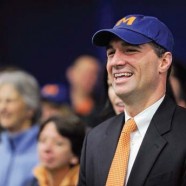
As educators, Nancy and I were treated like rock stars by Milton families and friends in Korea, China and Hong Kong last spring. Every educator deserves to feel like a rock star. Every teacher deserves to be celebrated for having chosen to teach. How do educators in the United States feel about their careers?
In America, baby boomers answered the call to educate at rates ahead of any generation since. Today, 40 talented faculty members who have each been dedicated to Milton for more than 25 years are a source of our strength. How will we fill their shoes when they retire? It’s impossible to underestimate this challenge. Assuring the quality and vitality of teaching at Milton is a priority for action in our Strategic Plan and our fund raising for the next five years.
What urgency do we feel about recruiting and developing these outstanding educators, for Milton and for our country?
The challenges to winning top talent in the teaching profession are social, cultural, political and economic. The scene was not much different when I made my own career decision. I was 22, and when I told people that I had chosen to teach, most of my parents’ friends said, “Oh, that’s wonderful. Being a teacher is quite noble. And then what are you going to do?” The message I got was that, perhaps, my career choice was not ambitious enough. Why not law, or medicine, or banking—a true “profession?”
Aspiring teachers make their way through a gauntlet to enter the profession, and they endure an even more rigorous analysis to stay there. My decision points at 22 years old were the same as those that potential teachers confront today: What am I willing to sacrifice to be a teacher? What am I willing to sacrifice for my family, my wife, my children? Teaching well, and continually changing and improving your pedagogy, is rigorous. Teaching requires intellectual and emotional investment beyond what many people are willing or able to consider. Today, after retirees, the greatest number of people leaving the profession are those with three to five years of experience. Does the prospect of what that statistic means to our country frighten you, as it does me?
We must do everything in our power to invest in teachers, and in students. It is that simple. Milton’s priority over the next decade is to be known, first and foremost, as a vibrant community of educators with an unparalleled commitment to students and to the quality of our work with them. We are intent upon building the highest quality and strongest faculty. We are planning to do everything in our power to be the school where every teacher wants to teach—known for the ingenuity and dedication of colleagues in the field, who can count on the support and the tools to excel.
We already have the environment that would attract potential teaching stars. We have serious work to do on building our endowment, however, to provide teachers with the highest levels of compensation and professional development. Similarly, we must invest in financial aid to continue drawing the talented students that teachers find so compelling and rewarding.
As the visiting reaccreditation team from NEASC noted in 2012: “Milton has fought above its weight class and won for years,” but this dynamic is unsustainable.
The schools that pay their teachers the best salaries are those with larger endowments. We must become one of those schools. We must invest in our future; there is no urgency more pressing for our School, and no cause more worthy of our best effort. Milton’s history, Milton’s values speak directly to this goal. What school is better positioned than Milton to choose this goal and succeed?
I love my job. I feel fortunate to have made the choice I did and to feel valued, as a teacher, an administrator, an educator. Join Milton in making this choice possible for potential educators, today and tomorrow, so they can enter a field that so desperately needs them without asking themselves what they are willing to sacrifice to do so.
–Todd B. Bland



